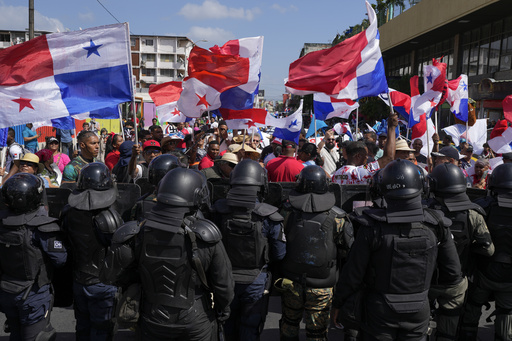
PANAMA CITY — U.S. Secretary of State Marco Rubio conveyed to Panamanian President José Raúl Mulino on Sunday the urgent need for Panama to diminish Chinese influence in the Canal area, warning of possible repercussions from the Trump administration if it fails to act. In response, Mulino firmly stated, “there is no real threat of retaking the canal or the use of force.”
This visit marked Rubio’s first international trip in his role as the top U.S. diplomat, where he engaged in direct discussions with Mulino, who has shown resistance against the recent U.S. pressure regarding the management of the canal—an essential route for global commerce. Representing President Donald Trump, who has been vocal about the need to return the canal to U.S. control, Rubio indicated to Mulino that the administration views China’s presence near the canal as potentially violating a treaty that facilitated its transfer to Panama in 1999. This agreement emphasizes the waterway’s neutrality.
“The current situation cannot continue, and if immediate action is not taken, the U.S. will need to implement steps to safeguard treaty rights,” a summary provided by the State Department quoted Rubio. Nevertheless, Mulino disagreed, expressing confidence that there is no genuine threat against the treaty or its legitimacy.
Rubio’s warning arrives at a time when Trump has intensified pressure on various neighbors and allies, including demands related to the canal. Additionally, Trump announced on Saturday significant tariffs against Canada and Mexico, which prompted retaliation from those nations.
Mulino characterized the meeting as one of “good-faith,” respectful, and productive, aimed at resolving uncertainties. He acknowledged the concerns raised by Washington regarding China’s involvement at both ends of the canal but assured that the consortium overseeing the ports was under audit and that the canal authority would provide Rubio with a comprehensive update. Furthermore, Mulino confirmed that Panama would not extend its agreement with China’s Belt and Road Initiative after its expiration.
As the meeting took place, approximately 200 protesters marched in Panama City, wielding flags and chanting slogans such as “Marco Rubio out of Panama,” and “Long live national sovereignty.” The demonstrators burned a banner featuring images of Trump and Rubio but were held back from approaching the presidential palace by riot police.
Rubio intended to inspect the canal later following the discussions. Mulino expressed a desire for Rubio’s visit to concentrate on mutual interests, including migration and counteracting drug trafficking. However, Rubio’s trip coincides with a freeze in U.S. foreign aid, which has resulted in the suspension of several programs aimed at tackling illegal migration and crime in Central America.
During his talks, Rubio emphasized the necessity of collaboration on Trump’s main priority of reducing illegal immigration, expressing gratitude to Mulino for accepting the repatriation of migrants. In a recent opinion piece, Rubio pointed to the chaos caused by mass migration, drug issues, and the antagonistic policies of Cuba, Nicaragua, and Venezuela. He also remarked on the extent of Chinese control at the canal’s port facilities, indicating vulnerability to Chinese government influence.
“We need to tackle this issue,” Rubio stated previously, underscoring Trump’s desire to reassert administration over the canal—a sentiment that has not been well-received by Panamanian officials. The canal, constructed by the United States, was handed over to Panama in 1999, and there is strong opposition to Trump’s calls for a return.
Despite the clear dismissal from Mulino regarding any discussions about ownership, there are speculations that Panama might consider a compromise to remove operations from the Hong Kong-based Hutchison Ports company, which currently has a 25-year non-competitive extension for its management. An audit is being conducted that could potentially prompt reassessment of this arrangement.
It remains uncertain whether Trump would accept a transfer of operational control to an American or European entity as a satisfactory outcome, especially since his demands appear to encompass more than just operational oversight.
Rubio’s itinerary also includes visits to El Salvador, Costa Rica, Guatemala, and the Dominican Republic amidst the backdrop of a halt in U.S. foreign assistance. The State Department announced on Sunday that Rubio had authorized exemptions for specific critical initiatives in the countries he plans to visit, although details regarding these waivers were not provided immediately.

